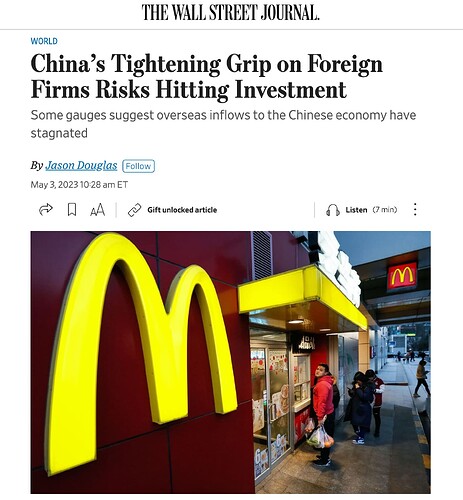-
由于Covid-19的封锁,去年进入中国的外国直接投资比前一年减少了近一半,创下了五年来的最低水平。中国继续吸引着全球投资的可观份额,但投资的增长并没有跟上中国经济扩张的步伐。由于中国政府扩大了其间谍法,针对西方咨询公司,以及与美国日益紧张的关系有可能限制投资,外国投资的前景变得更加不明朗。
-
根据中国的国际收支数据,2022年进入中国的外国直接投资比前一年下降了48%,达到1800亿美元。2021年,来自七国集团经济体的投资仅为163亿美元,低于2020年的247亿美元和2014年的353亿美元的峰值。中国的总体外国投资存量约为发达经济体的五分之一,约为发展中经济体的三分之一。
-
由于在贸易、技术和国家安全方面与西方国家发生冲突,以及低成本制造业目的地对中国的吸引力不断增加,中国作为外国直接投资目的地的吸引力已经受到削弱。拜登政府正计划对美国在这个世界第二大经济体的投资进行新的限制。北京还通过审问咨询公司的员工和对进口产品进行网络安全审查来吓唬外国高管。
-
中国当局限制或禁止海外人士进入一些经济指标、公司注册信息、专利和采购文件的数据库,使潜在投资者更难获得他们需要的信息。党的最高决策机构–政治局已经表示,吸引外国投资应该是一个优先事项。
-
麦当劳和星巴克,以及拉尔夫-劳伦和Tapestry等零售商,正在扩大在中国的业务,以利用其消费市场。然而,经济学家认为,在中国的外国投资将主要集中在几个大公司,而不是新进入者。
-
德国央行的数据支持这一看法,因为在中国的再投资已经增加,但撤资超过了新投资。研究公司Rhodium Group表示,这一趋势预计将在未来继续。
-
Foreign direct investment into China dropped by almost half last year from a year earlier, hitting the lowest level in five years due to Covid-19 lockdowns. China continues to attract a sizable share of global investment, but the increases have not kept pace with the expansion in China’s economy. The outlook for foreign investment has become murkier as Beijing has broadened its espionage laws, targeted Western consulting firms, and rising tensions with the U.S. threaten to restrain investments.
-
Foreign direct investment into China tumbled 48% in 2022 from a year earlier to $180 billion, according to Chinese balance-of-payments data. Investment from the Group of Seven economies was just $16.3 billion in 2021, down from $24.7 billion in 2020 and a peak of $35.3 billion in 2014. The overall stock of foreign investment in the country is around one-fifth the level of advanced economies and around one-third the level in developing economies.
-
China’s appeal as a destination for foreign direct investment has been dented by clashes with the West over trade, technology, and national security, as well as the growing attraction of lower-cost manufacturing destinations. The Biden administration is planning new restrictions on American investment in the world’s second-largest economy. Beijing has also spooked foreign executives by questioning staff at consulting firms and launching a cybersecurity review of imports.
-
Authorities in China have imposed restrictions or bans on overseas access to some databases for economic indicators, corporate-registration information, patents, and procurement documents, making it more difficult for potential investors to obtain the information they need. The Politburo, the party’s top policy-making body, has stated that attracting foreign investment should be a priority.
-
McDonald’s and Starbucks, as well as retailers such as Ralph Lauren and Tapestry, are expanding operations in China to take advantage of its consumer market. However, economists believe that foreign investment in the country will largely be concentrated among a few big companies, rather than new entrants.
-
Data from the German central bank supports this observation, as reinvestment in China has increased but divestments have exceeded new investments. This trend is expected to continue in the future, according to research firm Rhodium Group.
